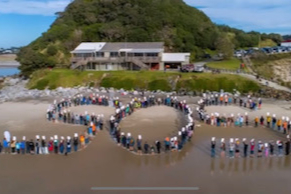Sand Mining Ends at Pākiri and Mangawhai After Decades-Long Battle
- Sep 1, 2025
- 2 min read
In a landmark win for communities and the environment, McCallum Bros Ltd has withdrawn its High Court appeal and ceased all offshore sand mining at Pākiri and Mangawhai, bringing an end to decades of destructive extraction. This decision means the company’s temporary permit has ceased immediately, leaving the beaches and seafloor free from mining for the first time in generations.
“This is a hard-fought victory for iwi, hapū, local communities, and all who have stood against sand mining across the generations,” says Natalie Jessup, General Manager of Tāngaro Tuia te Ora, Endangered Species Foundation. “In a time when so many of our natural areas are under threat, this win feels both surreal and deeply needed.”
In every campaign there is ground zero — the original people who oppose and draw attention to what is happening. In this case, it is the late Laly Haddon QSM, of Te Whānau o Pakiri, Omaha Marae, Ngāti Manuhiri, Ngāti Wai, Ngā Ruahine, Ngāti Ruanui.
We acknowledge all iwi groups and the many people from wider Pakiri and Mangawhai communities, for the multi-generational fight you have put into opposing this sand mining across the decades. Together we have won.
While the victory is significant, the legacy of sand mining is stark. Exposed rock formations at Mangawhai Heads – once buried under metres of ancient white sand deposited by the Waikato River – stand as reminders of how much has already been lost.

“The sand will not return” says Jessup. “But today we celebrate that the relentless dredging has finally stopped.”
Looking ahead
The Endangered Species Foundation says the fight is not over, with similar extractive pressures facing ecosystems around Aotearoa.
“We cannot allow greedy and destructive practices to keep hoovering up resources at the expense of nature,” Jessup says. “This win strengthens our resolve to protect other vulnerable habitats from attack.”
For now, though, the communities of Pākiri and Mangawhai are taking a moment to acknowledge a rare and emotional conservation victory. To everyone out there doing so much and doing something every day - our thanks and gratitude is immense.














